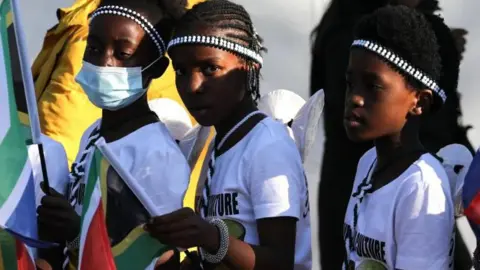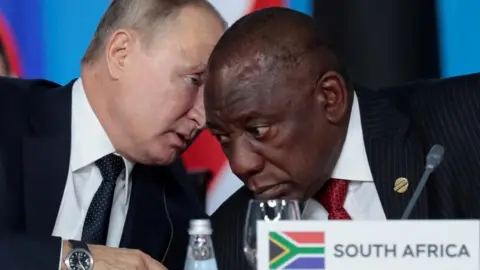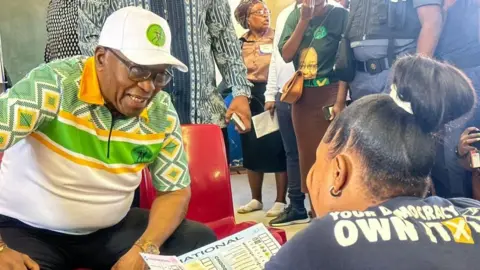Through Shingai Nyoka and Farooq Chothia, BBC Information, Johannesburg and London
 EPA
EPAMaintaining his credentials as a gifted negotiator, South African President Cyril Ramaphosa has outmaneuvered his key coalition partner – the Democratic Alliance (DA) – in talks over the formation of an anarchist government, as well as neutralizing the radical opposition. Steps are also being taken for. The events made nationalization of white-owned land difficult.
Mr Ramaphosa announced a 32-member Cabinet on Sunday, reserving 20 posts – more than 60% – for his African National Congress (ANC).
In contrast, they gave the centre-right DA six seats – less than 20% – despite the party barely reaching 30%, despite a power-sharing proposal signed with the ANC at the close of the May 29 election resulting in no clear winner. ,
However, to double the DA’s representation in government, Mr Ramaphosa appointed six party officials as deputy ministers, including Finance, where the ANC’s Enoch Godongwana – respected by both the business sector and the industry association – Are made. Rate.
The appointments followed challenging negotiations with the DA and an angry exchange of letters, in which Mr Ramaphosa accused the party of trying to form a “parallel government” in breach of the charter.
Mr Ramaphosa reduced the DA’s influence in the ancient cabinet by giving the other six posts to smaller parties – ranging from the Pan Africanist Congress (PAC) to the African Nationalist Liberty Front Plus – making it the most ideologically diverse government in the south. Africa’s historical past.
In line with tradition since the end of the apartheid system in 1994, the federal government additionally represents all race groups, with a significant range of ministerial or deputy ministerial positions given to members of white, colored – as That people of mixed race are called. In South Africa – and the Indian community.
This comes on the heels of an election in which voters confirmed that they “don’t care whether a cat is black or white, but whether it catches rats or not”, said political analyst Thembisa. Fakude told the BBC.
However, Mr Ramaphosa’s decision to sign a coalition agreement with the DA is still facing opposition.
Under the leadership of John Steenhuisen, the party is often accused of attempting to protect the economic privileges that white people had built up during apartheid – a charge it denies.
“Oil and water don’t mix,” a black security guard told the BBC.
Forming what he called a government of national unity, Mr Ramaphosa also gave a deputy ministerial post to the Muslim Al Jama’ah party, a clear signal that he intended to continue supporting the Palestinians over Israel, despite the DA’s opposition. Intend to.
This perception was strengthened by the appointment of former Justice Minister Ronald Lamola as Foreign Minister.
A lawyer, Mr. Lamola led South Africa’s opening arguments in the genocide case brought against Israel in the International Court of Justice.
He replaces Naledi Pandor, who failed to seek re-election to Parliament.
In addition to supporting the Palestinian cause, he also strengthened South Africa’s ties with the BRICS club of nations, which is seen as a rival to the West and Russia.
Political analyst Prince Mashele told the BBC that he doubts South Africa will remain a major force internationally as the ANC loses its political dominance.
He argued that South Africa’s partners in BRICS – which include Brazil, Russia, India and China – “will see that they are competing with a weaker partner”.
 EPA
EPAMr Ramaphosa was forced to appoint a coalition government after the ANC lost its parliamentary majority for the first time.
He was voted in for a second term by Parliament only after the DA agreed to support him in exchange for seats at the top table of the government.
In the May election the ANC received 40% of the vote, while the DA came in second place with 22%.
The DA initially demanded 11 cabinet posts – as well as a vice presidency or a ministerial post in the presidency for Mr. Steenhuisen.
In the end, Mr. Steenhuisen was forced to compromise with the post of Agriculture Minister.
But Mr Steenhuisen welcomed the deal, saying “the DA is proud to tackle this problem head on and shoot our playing field up to be the first real past in the seat of government nationwide”.
He said the DA has “refused to accept weak agreements and … has taken drastic cuts at times to ensure that the portfolios we get are ones with real content”.
Mr Steenhuisen’s position is likely to help allay the fears of the country’s white farmers, many of whom now join the two largest opposition parties – former President Jacob Zuma’s MK party and Julius Malema’s Economic Freedom Fighters (EFF) – feel threatened by the demands of To nationalize white-owned land.
But the DA leader’s appointment was overshadowed by Mr Ramaphosa’s surprise decision to give the new land reform ministry to the Pan Africanist Congress (PAC) – a former liberation movement that fought white-minority rule under the slogan “Africa for Africans”. Was.
The PAC ran its election campaign under the slogan “Our Land, Our Heritage”, and called for “ending colonialism and returning the lands to their new owners”.
The portfolio, which was previously combined with agriculture, will be held by PAC leader Mzwanele Nyohontso.
The PAC’s decision to serve in government for the first time is likely to help Mr Ramaphosa avoid criticism from MK and the EFF that he has betrayed the liberation struggle by forming an alliance with the DA.

Mr Ramaphosa kept all economic portfolios for the ANC, except for a plan to hand the Trade and Industry Ministry to the DA after strong resistance from within his own party, as well as from the black business lobby and trade union movement.
He believed that handing over the portfolio to the DA would weaken the ANC’s black economic empowerment policies. The pro-free market DA opposes the policies, arguing that they stifle investment, promote corruption and enrich the ANC’s business cronies.
In his regular column on the TimesLIVE news site, former Business Day editor Peter Bruce said that top ANC officials “cannot risk the DA having anywhere near the same business levers”, describing Mr Steenhuisen as a “mediocre industry”. Was forced to settle for. “To the Ministry of Trade and Industry.
Political analyst Ongama Mtimke told the BBC that the portfolios held by the ANC were important in tackling racial inequality, and that Mr Ramaphosa’s choice was intended to “show comrades that as far as taking the revolution forward is concerned, we are still are also on the right track”.
But Mr Phakude said the ANC and DA were likely to find substantial common ground on economic policy.
The ANC had moved to the center since taking power three decades ago, although it may still disagree with the DA on issues such as privatisation, Mr Fakude said, adding: “Also I believe they will in general Let’s keep the ratio of a bundle of goods to.
Mr Ramaphosa gave the DA alternative key portfolios – including public general education where literacy levels are low and language coverage in schools is a deeply emotive factor, crowd work and infrastructure, and housing affairs.
The closure is as obvious as a political hot potato – as Mr Fakude explained, it is “related to borders and illegal African immigration into South Africa”.
The Crowd Works division has been embroiled in several corruption scandals and the DA has vowed a “zero-tolerance” option to deal with the situation.
Mr Ramaphosa presented two portfolios to the Inkatha Liberty Birthday Celebration (IFP). Despite forming an alliance with the DA, the party has taken a neutral stance since the vote, and has advised the two major parties to resolve their differences while negotiating the composition of the cabinet.
Mr Ramaphosa gave its head Welenkosini Hlabisa the ministry of Cooperative Governance and Standards Affairs. With the IFP close to the Zulu monarchy, Mr Hlabisa’s appointment is as clear as any other visit by Mr Ramaphosa to neutralize blackmail by Mr Zuma, who has largely called for South Africa to cede higher powers. Ceremonial monarch and chief.
Mr Ramaphosa also gave the all-important police ministry to an ANC leader from Mr Zuma’s home province of KwaZulu-Natal, which has a long history of political violence.
Senzo Mchunu replaced Bheki Cele, another ANC leader from KwaZulu-Natal, who was not re-elected.
Mr Cele largely ignored violence in the province, the closest he has come to cooperation with a commission investigating corruption, in riots that followed Mr Zuma’s imprisonment for contempt of court in 2021 that left more than 300 people dead. Ignored the proposal to do so. Through his presidency.
KwaZulu-Natal is likely to face a fresh blackmail of unrest when Mr.
Mr Zuma denies any wrongdoing and views the case as politically progressive.
Holding a deep grudge against Mr Ramaphosa, who ousted him from the presidency in 2018, the previous president campaigned for MK to break with the ANC in late December.
He led MK to third place in the election and was instrumental in depriving the ANC of its parliamentary majority.
With the ANC and DA now united, MK will consider the status of legitimate opposition, setting the stage for a fierce war of words with the ANC and its ancient coalition partners.
Additional BBC stories on the South African election:
 Getty Pictures/BBC
Getty Pictures/BBCDiscover more from news2source
Subscribe to get the latest posts sent to your email.





